Since human being has evolved by selection of nature and adaptation through nature environment and solving problems of food, clothing and shelter in this process is an essential selection of human being, human being is considered as having an instinct...
http://chineseinput.net/에서 pinyin(병음)방식으로 중국어를 변환할 수 있습니다.
변환된 중국어를 복사하여 사용하시면 됩니다.
- 中文 을 입력하시려면 zhongwen을 입력하시고 space를누르시면됩니다.
- 北京 을 입력하시려면 beijing을 입력하시고 space를 누르시면 됩니다.

생활공간(生活空間)에서 창조적 환경(環境)에 대한 고찰 (행복의 마음을 중심으로) = A study on Creative Environment in a Living Space
한글로보기부가정보
다국어 초록 (Multilingual Abstract)
Since human being has evolved by selection of nature and adaptation through nature environment and solving problems of food, clothing and shelter in this process is an essential selection of human being, human being is considered as having an instinctive disposition. However, the egoistic aspect in human being has increasingly settled down in the inside of human being through self-supporting community live. This study intends to review the part of happiness in our living space through deductive method. First of all, our living space in the modern times has been changed into the humanist environment, which caused disconnection of communication and enjoyment and led to the results such as emotional disorder and loss of altruism. This study classified the causes of it into three aspects; estranged nature, disorder and disconnection and mental poverty. Further more, it also suggested the stages of “adaptation with nature” “challenge to nature” and “harmony with nature” as the stages of change in living space for looking into such causes, and attempted to promote understanding by presenting the example of it by stage. In addition, this study suggested the mind of happiness to be reviewed in three stages. By presenting three stages – instinct mind (the first stage), evolutionary mind (the second stage) and creative mind (the third stage), it posed the following questions: ‘Why does human being seek happiness instinctively?’ ‘How has the concept of happiness been changed in the evolution of human being?’ and ‘What should we do in order to have happiness?” For satisfying high-level desire for the future happiness, it is important to have a creative mind through activism that focuses on motivation and process, not depending on the result.
참고문헌 (Reference)
1 김주환, "환경과 생활" 신라 1995
2 리즈 호가드, "행복" 예담 2006
3 정대익, "진화심리학의 개념적 쟁점들: 모듈성, 적응주의, 그리고 유전자 환원주의" 2003
4 딜런 에번스, "진화심리학" 김영사 1999
5 션B.개럴, "이보디보 생명의 블랙박스를 열다" 지호 2007
6 서울특별시, "서울의 환경: 환경백서" 2008
7 이혜주, "생활환경에 나타난 퓨전문화에 관한 연구" 2002
8 데이비드 와그너, "미친뇌가 나를 움직인다" 사이 2006
9 데이비드 와이너, "미친 뇌가 나를 움직인다" 사이 2006
10 윤일, "문화공간에서 공간문화로의 함의" 한국문화공간건축학회 (28) : 49-58, 2009
1 김주환, "환경과 생활" 신라 1995
2 리즈 호가드, "행복" 예담 2006
3 정대익, "진화심리학의 개념적 쟁점들: 모듈성, 적응주의, 그리고 유전자 환원주의" 2003
4 딜런 에번스, "진화심리학" 김영사 1999
5 션B.개럴, "이보디보 생명의 블랙박스를 열다" 지호 2007
6 서울특별시, "서울의 환경: 환경백서" 2008
7 이혜주, "생활환경에 나타난 퓨전문화에 관한 연구" 2002
8 데이비드 와그너, "미친뇌가 나를 움직인다" 사이 2006
9 데이비드 와이너, "미친 뇌가 나를 움직인다" 사이 2006
10 윤일, "문화공간에서 공간문화로의 함의" 한국문화공간건축학회 (28) : 49-58, 2009
11 스티븐 핑거지, "마음은 어떻게 작동하는가" 동녘사이언스 2007
12 박주연, "도시와 인간의 불안한 공존" 이화여대 2006
13 모기 게이치로, "뇌와 창조성" 눈과 마음 2006
14 한국경관생태연구회, "경관생태학" 동화기술 2001
동일학술지(권/호) 다른 논문
-
건축요소로서 르 꼬르뷔지에의 필로티의 개념과 전개과정에 관한 연구
- 한국문화공간건축학회
- 조주현
- 2010
- KCI등재후보
-
- 한국문화공간건축학회
- 김민규
- 2010
- KCI등재후보
-
- 한국문화공간건축학회
- 장지혜
- 2010
- KCI등재후보
분석정보
인용정보 인용지수 설명보기
학술지 이력
| 연월일 | 이력구분 | 이력상세 | 등재구분 |
|---|---|---|---|
| 2026 | 평가예정 | 재인증평가 신청대상 (재인증) | |
| 2020-01-01 | 평가 | 등재학술지 유지 (재인증) |  |
| 2017-01-01 | 평가 | 등재학술지 유지 (계속평가) |  |
| 2013-01-01 | 평가 | 등재학술지 선정 (등재후보2차) |  |
| 2012-01-01 | 평가 | 등재후보 1차 PASS (등재후보1차) |  |
| 2011-01-01 | 평가 | 등재후보학술지 유지 (등재후보2차) |  |
| 2010-01-01 | 평가 | 등재후보 1차 PASS (등재후보1차) |  |
| 2009-01-20 | 학술지명변경 | 한글명 : 한국문화공간건축학회 -> 한국문화공간건축학회논문집 |  |
| 2008-01-01 | 평가 | 등재후보학술지 선정 (신규평가) |  |
학술지 인용정보
| 기준연도 | WOS-KCI 통합IF(2년) | KCIF(2년) | KCIF(3년) |
|---|---|---|---|
| 2016 | 0.28 | 0.28 | 0.25 |
| KCIF(4년) | KCIF(5년) | 중심성지수(3년) | 즉시성지수 |
| 0.23 | 0.23 | 0.406 | 0.25 |




 KCI
KCI






